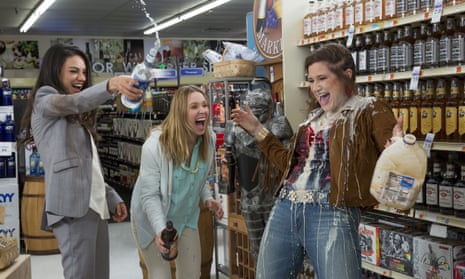Today it’s bad to be good. Bad Moms, a film about the impossible expectations of parenting by the people who did The Hangover, has been a massive summer hit. You can understand why – mothers want to see their lives represented, and as a demographic they’re being massively underserved. A new report shows that only 35% of the characters in Hollywood films and shows last year were over-40, with 80% of those older people in films being men. (The year she turned 41, Meryl Streep said she was offered three roles — all to play witches.) But the premise of Bad Moms – three drinky, shaggy mothers revel in their inadequacy, and gang up against the bullying mum who runs the PTA – while having the smell of something empowering and fresh relies, of course, on mothers being pitted against each other, relies on that self-perpetuating culture of rivalry, relies on the ancient bones of our own insecurities. Which is funny, until you leave the cinema.
Elsewhere, a new brand called Selfish Mother sells its “Winging It” T-shirts at John Lewis, and what once seemed to be a quietly shocking statement of rebellion, is now… normal. The bad mum has never been more fashionable. The pilot for Motherland, the brilliant new BBC sitcom by Sharon Horgan and Graham Linehan, takes place in the hazy half-light of a half-term holiday, when a woman must call on the wonky kindness of strange mums to help with her kids. The other women are passive-aggressive and perfect, the very opposite of our broken heroine. In a spotless basement kitchen the differences between good and bad mums are illustrated by such sports as whipping up a quick bolognese for 10, and chopping a finger off while cutting frozen cheese. The children are just noise in the background – the mothers are the focus, and none of them are OK, even if their hair looks amazing.
Which is the thing, isn’t it. By the time we get here, to independent adulthood and bags for life and cats, we have learned that even if a person looks like they’re cool and coping, they too are human, and are dealing with the agonies that make us whole. On screen these domestic wars are fought with screams and cake thrown – in real life they’re fought inside our heads.
Like being “good”, being bad is only quantifiable when compared with other’s efforts, and it’s tempting to see the cupcake bakers and yoga retreaters as rivals because they make us feel like losers, never more so than when all educational achievements are stripped away and all you have to show for yourself is a half-dressed four-year-old covered in ketchup. But while there are, no doubt, some women who find responsibilities a breeze, there are surely more who, while appearing to succeed, are trying really hard to find a semblance of order in their wind-strewn lives.
To be bad means to have depth. So, to be good is to be seen as shallow. It’s one thing to say “embrace your badness”, another to say that if you look like nothing hurts then you’re lying. Our modern woman-ness sometimes seems to be built on competitive honesty and an insistence that we are failing; self-deprecating as if it was an Olympic sport, with medals. All our long lives, from those side-eyed conversations in the playground to NCT teas and PTA meetings, we’ve trained ourselves to smell out difference, and attack it, however sneakily. There is us, and there is them. Today, you and me, we’re a bit shoddy, we’re chaotic, anxious, dry-skinned, crap. You see us narrating modern literature, feeling bad about our necks, getting drunk, doing bawdy stand-up about our vaginas. We are not them – other women – women who are yogic and happy and basic, who do things properly.
As a reaction to the cult of perfectionism that came before, there’s huge liberation in realising that everybody struggles, all the time. But by classifying and dividing our peers into good and bad, even if we place ourselves in the failing camp, with its stained jumpers and late replies, we’re doing ourselves a disservice. It’s fine to be bad, but it’s not worse to be good.
Email Eva at e.wiseman@observer.co.uk or follow her on Twitter @EvaWiseman

